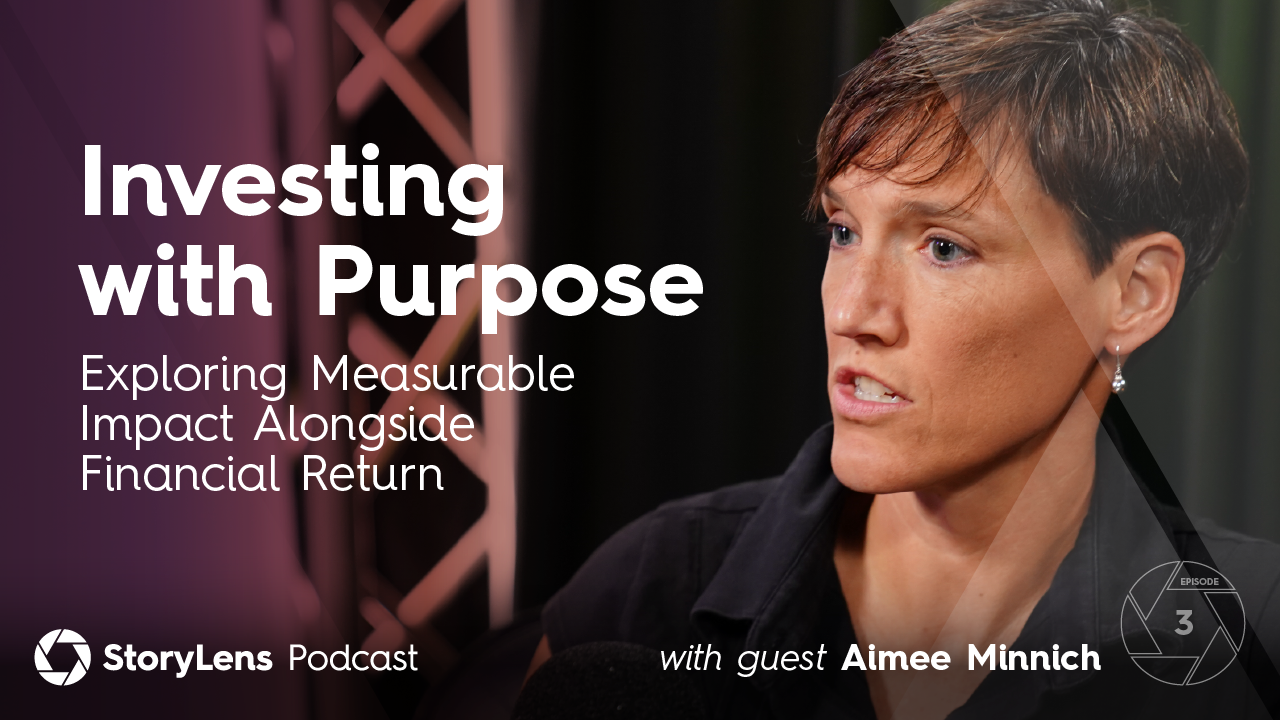
17 Sep Investing with Purpose: Exploring Measurable Impact Alongside Financial Return
At StoryOne, wealth is never just about money. It is about meaning, direction and the story your family is writing together.
In the third episode of the StoryLens podcast, StoryOne partners John Christensen and Cameron Bond sit down with special guest Aimee Minnich to explore the world of impact investing where financial capital and family purpose converge. Together, they unpack how families can align resources with values, the opportunities and challenges of impact-driven portfolios, and why this conversation is about more than returns. It’s about stewardship, calling, and the legacy families want to leave behind.
From Law to Legacy
Some careers unfold in a straight line. Others take unexpected turns that reveal a deeper calling. For Aimee Minnich, Chief Impact Officer at Impact Foundation, the path began with law school and a promising career at a firm. But what she discovered along the way was a hunger for something more. She realized that money and power alone could not sustain her. Instead, she was drawn to questions of meaning, purpose, and the role of generosity in shaping lives. That search led her to the world of impact investing.
Discovering Impact Investing
Impact investing is not an asset class. It is a philosophy. Aimee explains it as intentionally placing capital to achieve measurable social and environmental good while still seeking financial return. Every investment has an impact, she reminds us. The question is whether families will be intentional about the kind of impact they want their wealth to have. For Aimee, this approach became a way to connect business, generosity, and legacy in ways that strengthen both families and communities.
Why Business Matters
In the conversation, Aimee makes a striking observation. Charity alone cannot solve the deepest problems of our world. If charity were enough, she says, Haiti would be thriving given the volume of aid it has received. Business is what scales innovation, distributes products, and sustains long-term change. From the washing machine that revolutionized family life to life-saving medicine made available at scale, business has been the engine. This conviction fuels Aimee’s belief that investing should reflect mission and values, not just financial targets.
Stories of Change
The examples Aimee shares are both global and local. In Uganda, boda boda taxi drivers are able to lease-to-own motorcycles while also gaining financial training and discipleship. In Ethiopia, apple orchards were planted to create jobs and strengthen the local economy. In the United States, family businesses with deep-rooted values have found new ownership structures that preserve those values while providing growth capital. Even media and entertainment are part of the story, with investments in family-friendly films and streaming platforms that provide healthier options for kids and teens.
Guardrails and Relationships
Behind each of these stories is a careful process. At Impact Foundation, every opportunity is vetted against charitable purpose and financial prudence. Accountability to the IRS and state regulators provides structure, but relationships provide the trust. Aimee emphasizes that the most important currency is not money but connection. It is through trusted relationships that capital can be invested wisely and returned responsibly. That relational foundation makes impact investing both practical and deeply human.
Legacy With Purpose
For families, impact investing represents an opportunity to align capital with calling. It is a way to bring mission, vision and values into the heart of financial decisions. As Aimee reflects, the glory of God is revealed when people are fully alive, giving of themselves in ways that reflect who they were created to be. Business, generosity, and legacy can come together in powerful ways. The result is more than return on investment. It is a legacy of lasting good.
Stay Connected
Stay connected with the StoryLens Podcast for future conversations. Your story is anything but ordinary—and that’s exactly where we begin.
